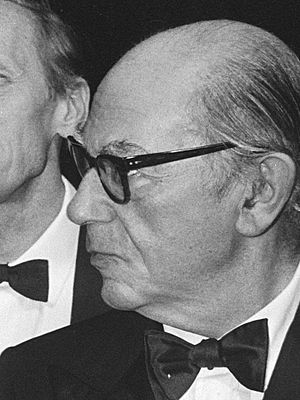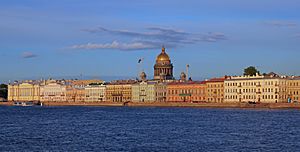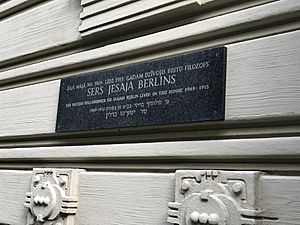Isaiah Berlin facts for kids
Quick facts for kids
Isaiah Berlin
|
|
|---|---|

Berlin in 1983
|
|
| Born | 6 June 1909 Riga, Livonia, Russian Empire
|
| Died | 5 November 1997 (aged 88) Oxford, England, United Kingdom
|
| Education | St Paul's School, London |
| Alma mater | Corpus Christi College, Oxford |
| Spouse(s) |
Aline de Gunzbourg
(m. 1956) |
| Era | 20th-century philosophy |
| Region | Western philosophy |
| School | |
| Institutions | |
| Doctoral students |
|
| Other notable students |
|
|
Main interests
|
|
|
Notable ideas
|
|
|
Influenced
|
|
Sir Isaiah Berlin (born June 6, 1909 – died November 5, 1997) was a famous thinker from Russia and Britain. He studied how societies and governments work, and he was a philosopher and a historian of ideas. This means he looked at how big ideas changed throughout history. Even though he didn't like writing things down much, his talks and lectures were often recorded. These recordings were later turned into essays and books, with help from his editor, Henry Hardy.
Isaiah Berlin was born in Riga, which is now the capital of Latvia. At that time, it was part of the Russian Empire. When he was six, his family moved to Petrograd, Russia. There, he saw the big changes of the 1917 revolutions. In 1921, his family moved to the UK. He went to St Paul's School, London, and then to Corpus Christi College, Oxford. At just 23, Berlin became a special fellow at All Souls College, Oxford. Besides his own work, he translated books from Russian into English. During World War II, he worked for the British government's diplomatic service.
From 1957 to 1967, he was a professor at the University of Oxford, teaching about social and political ideas. He also led the Aristotelian Society from 1963 to 1964. In 1966, he helped create Wolfson College, Oxford, and became its first leader. For his important work, he received several honors. He was made a Commander of the CBE in 1946, became a Sir in 1957, and joined the special Order of Merit in 1971. He also led the British Academy from 1974 to 1978. In 1979, he won the Jerusalem Prize for always supporting people's freedoms.
Isaiah Berlin's ideas about freedom and value pluralism (which means different good values can sometimes clash) are still very important. He was also strongly against Marxism and communism.
Contents
Early Life in Russia and UK

Isaiah Berlin was born on June 6, 1909, into a wealthy Jewish family. His father, Mendel Berlin, traded timber and was a leader in the timber business. His mother, Marie, spoke Russian and Latvian. Isaiah spent his first six years in Riga. His family also lived in Andreapol, a small town linked to their timber business, and then in Petrograd.
In Petrograd, his family lived in a building with other people, including a princess. But when the October Revolution happened in 1917, everything changed. Berlin saw the protests and crowds marching in the city. Life became hard under the new Bolshevik government, which saw his family as rich business owners.
Because of these difficulties and some anti-Jewish feelings, his family decided to leave Russia. They moved to Britain in early 1921 when Isaiah was eleven years old. In London, they first lived in Surbiton, then Kensington, and later Hampstead.
When he first arrived in London, Berlin knew very little English. But he learned it quickly and was very good at it within a year. Besides Russian and English, he also spoke French, German, and Italian. He also knew some Hebrew, Latin, and Ancient Greek. Even with his perfect English, Berlin always said he was a Russian Jew from Riga. He felt that this was a core part of who he was.
Education and Career
Isaiah Berlin went to St Paul's School in London. After school, he applied to Oxford University. He was accepted into Corpus Christi College, Oxford. He studied ancient history and philosophy and did very well. He even won a special prize for his philosophy work.
He then studied philosophy, politics and economics and again achieved top honors. Soon after, he became a philosophy teacher at New College, Oxford. He was then chosen for a special fellowship at All Souls College, Oxford. He was the first Jewish person who had not converted to Christianity to get this fellowship there.
While studying, he became friends with many other bright students. In 1940, he gave a philosophy paper at Cambridge University. A famous philosopher named Ludwig Wittgenstein was there. Wittgenstein didn't agree with Berlin's ideas in the paper, but he praised Berlin for being honest and thoughtful.
Berlin stayed at Oxford for most of his life. During World War II, he worked for the British government in New York, Washington, D.C., and Moscow. He wrote important reports, like one about American senators for the British government. For his work, he received the CBE honor in 1946. He also had important meetings with the Russian poet Anna Akhmatova in 1945 and 1946.
Personal Life
In 1956, Isaiah Berlin married Aline Elisabeth Yvonne Halban. She came from a wealthy family with Russian and Jewish roots in Paris. She was also a champion golfer in France.
Berlin was recognized for his work by important groups like the American Academy of Arts and Sciences. He also played a key role in starting Wolfson College, Oxford in 1966. This college was created to be a place of excellent learning that was also fair and open to everyone.
Isaiah Berlin passed away in Oxford on November 5, 1997, at the age of 88. He is buried in Wolvercote Cemetery there. Many people remembered him as a brilliant thinker with a great love for life, people, ideas, music, and art. They said he had an amazing ability to understand human feelings and hopes. He was known for his strong belief in freedom and human dignity.
Isaiah Berlin's Ideas
How He Wrote His Books
Isaiah Berlin didn't really like to write things down. Instead, he would often talk into a tape recorder. His books and essays were created by transcribing these conversations or his lectures. This way of working meant his writing style was very lively, just like his conversations. Even his letters were dictated, sometimes with his jokes and laughter accidentally included!
Two Kinds of Freedom
One of Berlin's most famous ideas is about "Two Concepts of Liberty" (two kinds of freedom). He talked about this in a lecture in 1958.
- Negative Liberty: This is about being free from things. It means no one, especially the government, should stop you from doing what you want, as long as you don't harm others. Think of it as having a space where you can do your own thing without interference.
- Positive Liberty: This is about being free to do things. It's about having the power and ability to control your own life and make your own choices. Berlin warned that this idea could be misused. Sometimes, people might think they know what's best for others and try to force them to be "free" in a certain way. This could lead to governments trying to control people's lives too much.
Different Values
Berlin believed in something called "value pluralism." This means that there are many different good values in the world, like freedom, fairness, kindness, and truth. He argued that these values are created by people, not just found in nature.
Sometimes, these good values can clash. For example, being completely free might sometimes go against making sure everyone is treated fairly. Or, telling the truth might conflict with keeping a promise. Berlin thought that these clashes are a natural part of human life. He believed that there isn't always one perfect answer when values conflict.
The Hedgehog and the Fox
One of Berlin's most popular essays is called "The Hedgehog and the Fox." This title comes from an old Greek saying: "The fox knows many things, but the hedgehog knows one big thing." Berlin said he didn't mean this idea too seriously, but it became very famous.
He used this idea to divide thinkers into two groups:
- Hedgehogs: These thinkers see the world through one main, big idea. Everything they think about fits into this one idea.
- Foxes: These thinkers have many different ideas and experiences. They don't try to fit everything into one single view. They see the world as complex and full of different things.
For example, Berlin suggested that Plato was like a hedgehog, trying to find one perfect truth. But William Shakespeare was like a fox, showing many different ways of looking at life.
Other Important Works
Berlin also wrote a lot about Russian history and thinkers. His book Russian Thinkers is a collection of his essays on this topic. He also wrote short descriptions of important people he knew, like Winston Churchill and Franklin Delano Roosevelt. These are collected in a book called Personal Impressions.
Remembering Isaiah Berlin
Many events and scholarships are named after Isaiah Berlin at Oxford University. For example, there's the Berlin Quadrangle at Wolfson College, Oxford. The Isaiah Berlin Association of Latvia holds an annual day and lectures to honor his ideas. The British Academy also has an Isaiah Berlin lecture series.
Many books from Berlin's personal library were given to Ben-Gurion University of the Negev in Beer Sheva, Israel. There's even an "Isaiah Berlin Room" there, which looks like his study at Oxford. His old school, St Paul's School, has an Isaiah Berlin Society. This group invites famous academics to talk about important life questions with students.
Published Works
Most of Isaiah Berlin's books from 1978 onwards were edited by Henry Hardy. Many of them are collections of his lectures, essays, and letters.
- Karl Marx: His Life and Environment, 1939.
- The Hedgehog and the Fox: An Essay on Tolstoy's View of History, 1953.
- Russian Thinkers, 1978.
- Concepts and Categories: Philosophical Essays, 1978.
- Against the Current: Essays in the History of Ideas, 1979.
- Personal Impressions, 1980.
- The Crooked Timber of Humanity: Chapters in the History of Ideas, 1990.
- The Sense of Reality: Studies in Ideas and their History, 1996.
- The Proper Study of Mankind: An Anthology of Essays, 1997.
- The Roots of Romanticism, 1999.
- Three Critics of the Enlightenment: Vico, Hamann, Herder, 2000.
- The Power of Ideas, 2000.
- Freedom and Its Betrayal: Six Enemies of Human Liberty, 2002.
- Liberty, 2002.
- The Soviet Mind: Russian Culture under Communism, 2004.
- Flourishing: Letters 1928–1946, 2004.
- Political Ideas in the Romantic Age: Their Rise and Influence on Modern Thought, 2006.
- Unfinished Dialogue (with Beata Polanowska-Sygulska), 2006.
- Enlightening: Letters 1946–1960, 2009.
- Building: Letters 1960–1975, 2013.
- Affirming: Letters 1975–1997, 2015.
Images for kids
-
The Angliyskaya Embankment in Saint Petersburg, where Berlin lived as a child during the Russian Revolutions
-
The Berlin Quadrangle, Wolfson College
See Also
 In Spanish: Isaiah Berlin para niños
In Spanish: Isaiah Berlin para niños
- Gerald C. MacCallum Jr.
 | James B. Knighten |
 | Azellia White |
 | Willa Brown |




